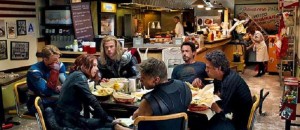Not every irascible, sharp-tongued gent striding the live stage this holiday season is a Victorian killjoy with an insomnia problem.
In fact, you can just about imagine Truman Capote recoiling in horror at Ebenezer Scrooge's frumpy evening wear. (Definitely not Tiffany's material.)
But the one-man show “Tru,” which just opened in an absorbing production at Diversionary Theatre, does unfold at Christmas, and its subject's ambivalence about the season proves to be a window into his singular life and art.
“Tru” is the late playwright and screenwriter Jay Presson Allen's 1989 portrait of Capote, the writer of “In Cold Blood” and “Breakfast at Tiffany's” who became a curious kind of cultural mascot long after his creative drive had dwindled.
The play catches up with Capote at that moment in his life (it's 1975, and he's 51), as he pads around his New York apartment grousing about the cold shoulders he's receiving from his super-wealthy friends over the publication of a dishy tell-all tale.
In his heyday, Capote was instantly recognizable (and much-impersonated) for his high speaking voice, elfin physique and taste for bold fashion statements, including his signature fedora.
At Diversionary, Todd Blakesley's performance captures those elements beautifully and unerringly, right down to Capote's self-consciously elegant way of wielding a martini glass.
But Blakesley's remarkable turn goes far deeper than the familiar Capote-isms; he fully inhabits this fascinating and contradictory figure, with all his chutzpah and bravado and aching, barely concealed vulnerabilities.
At first we learn what's happening in his life — chiefly, the furor over the first published chapters from his (ultimately unfinished) novel “Answered Prayers” — only through his side of phone conversations.
Soon, though, he's addressing us directly — although the play suggests it might just be an outgrowth of Capote's own habit of self-patter. As he says at one point: “I like to talk to myself about myself.”
He drops plenty of examples of his often withering, offhand wit: how “good taste is the death of art,” and how a person's IQ drops two points for every year spent living in California (although Capote himself did spend plenty of time in Palm Springs).
He also speaks of famous friends and faithless lovers, and affirms his utter comfort with his gay identity, at a time when America barely acknowledged there could be such a thing.
But the most affecting moments come in his confessions to a lifetime of unease — of feeling the bottom is always about to drop out, like the gallows floor under the many condemned men he interviewed for “In Cold Blood.” (That 1966 saga of a notorious Kansas murder case essentially made Capote's career.)
Those problems stemmed from growing up in a broken Southern family; at times, Capote flashes back to past traumas, in scenes rendered to excellent effect by director Derek Charles Livingston, composer/sound designer Kevin Anthenill and lighting designer Luke Olson.
Read more: Review: ‘Tru' offers wit, insight






